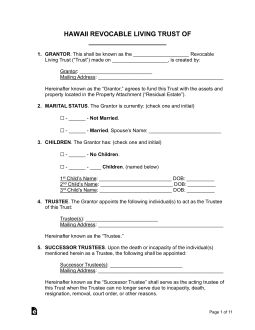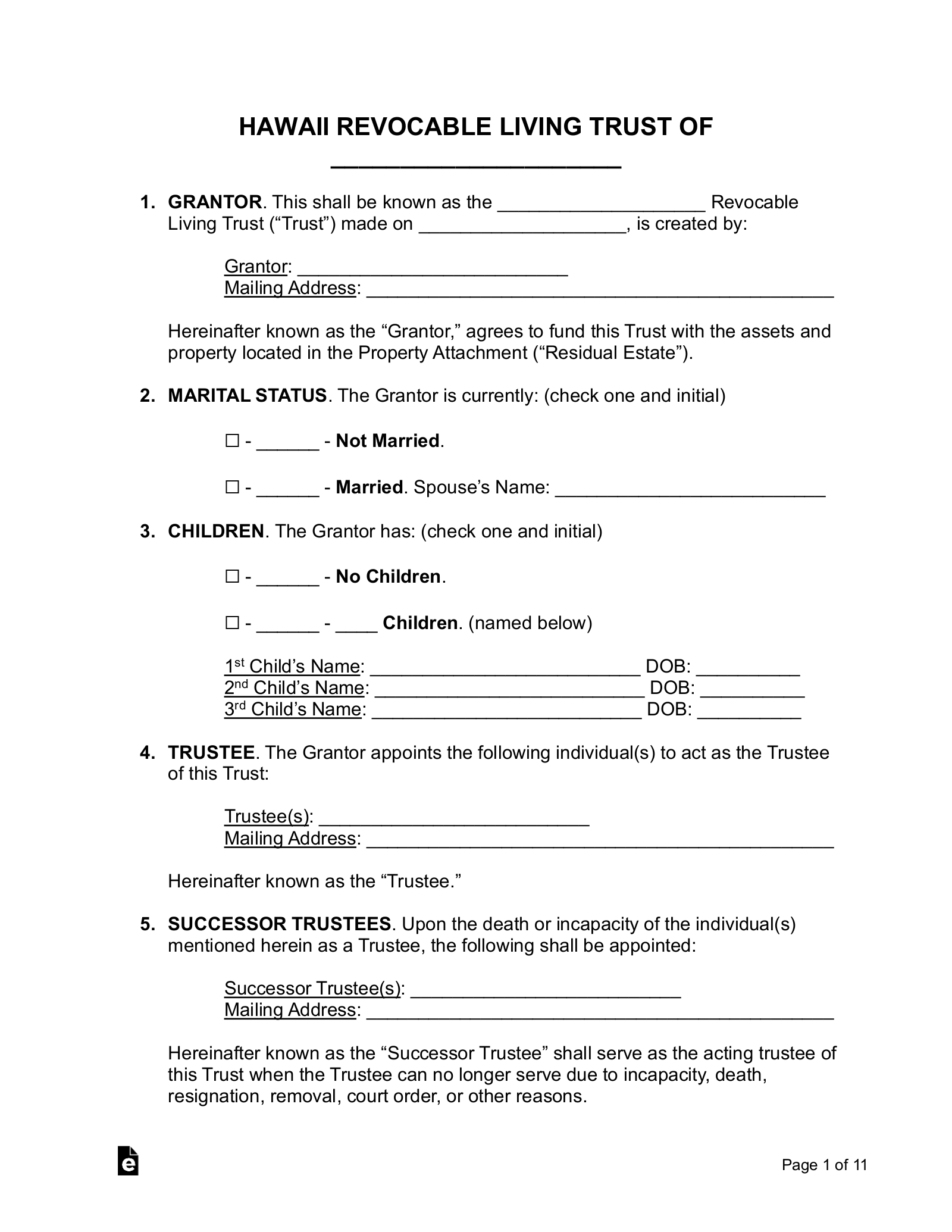Updated March 20, 2024
A Hawaii living trust is a document that allows a grantor to set aside certain assets for their heirs or other beneficiaries. Unlike a will, a trust bypasses the probate process and enables the beneficiaries to collect the assets immediately after the grantor’s death. With a living (revocable) trust, the grantor may also act as the trustee during their lifetime.
Requirements (4)
- Capacity: The grantor must have the mental capacity to establish a trust.
- Intention: The grantor must have the intention of establishing a trust.
- Beneficiary: The trust must have a definite beneficiary, unless it is a charitable trust or a trust established for the care of an animal.
- Trustee’s Duties: The trustee must have specific duties to perform.[1]
Registration
A trust is not required to be registered under Hawaii state law. A trust may be registered in Hawaii by filing a Trust Registration Statement with the court clerk in the applicable judicial circuit.[2]
Laws
Amending/Revoking – A revocable trust may be terminated in the manner outlined in the terms of the trust instrument.[3]
Bond Requirement – A trustee is only required to give a bond if they are ordered to do so by the court or if this is a requirement set out in the terms of the trust.[4]
Certification of Trust – To confirm the existence of the trust and its provisions, the trustee may provide a certification of trust to a person other than a beneficiary. The certification must state the name of the trust, the date that it was executed, the identity of the grantor, and the identity, address, and powers of the trustee.[5]
Co-Trustees – If co-trustees cannot reach a unanimous decision, they may act instead by majority decision.[6] If a co-trustee is temporarily unavailable or incapacitated, the other trustees may act on their own for the trust.[7]
Contesting a Trust – A person must commence an action to contest a trust within 90 days of receiving notice from the trustee informing them of the trust’s existence. If no notice was sent, the action can occur anytime within five years of the grantor’s death.[8]
Costs Related to the Trust – The costs of administering the trust must be reasonable in relation to the trust property and its intended purpose.[9]
Jurisdiction – A trust created in another jurisdiction is valid so long as its creation complies with the laws of that jurisdiction.[10]
Oral Trusts – “Clear and convincing evidence” is required for the creation of an oral trust.[11]
Pet Trusts – A trust designated for the care of a pet or other domestic animal is valid. The trust terminates when it ceases to provide for any living animal.[12]
Signing Requirements – Hawaii state law does not require that a trust be signed.
Spendthrift Provision – A spendthrift provision is only valid if it restrains both voluntary and involuntary transfers of the beneficiary’s interest.[13]
Trustee’s Compensation – Unless the trust instrument states otherwise, the trustee is entitled to reasonable compensation as determined by state statute.[14] The amount of compensation that a trustee may receive depends on the value of the trust assets.
Trustee’s Duties – The trustee has a duty to administer the trust in good faith, in accordance with its stated purpose, and in the interest of the beneficiaries.[15] The trustee must also take reasonable steps to take control of and protect trust property.[16]
Trustee’s Powers – In addition to those powers conferred by the trust instrument, the trustee has any powers that are reasonably necessary for investing, distributing, and managing the trust property in alignment with the overall strategy of the trust.[17]


